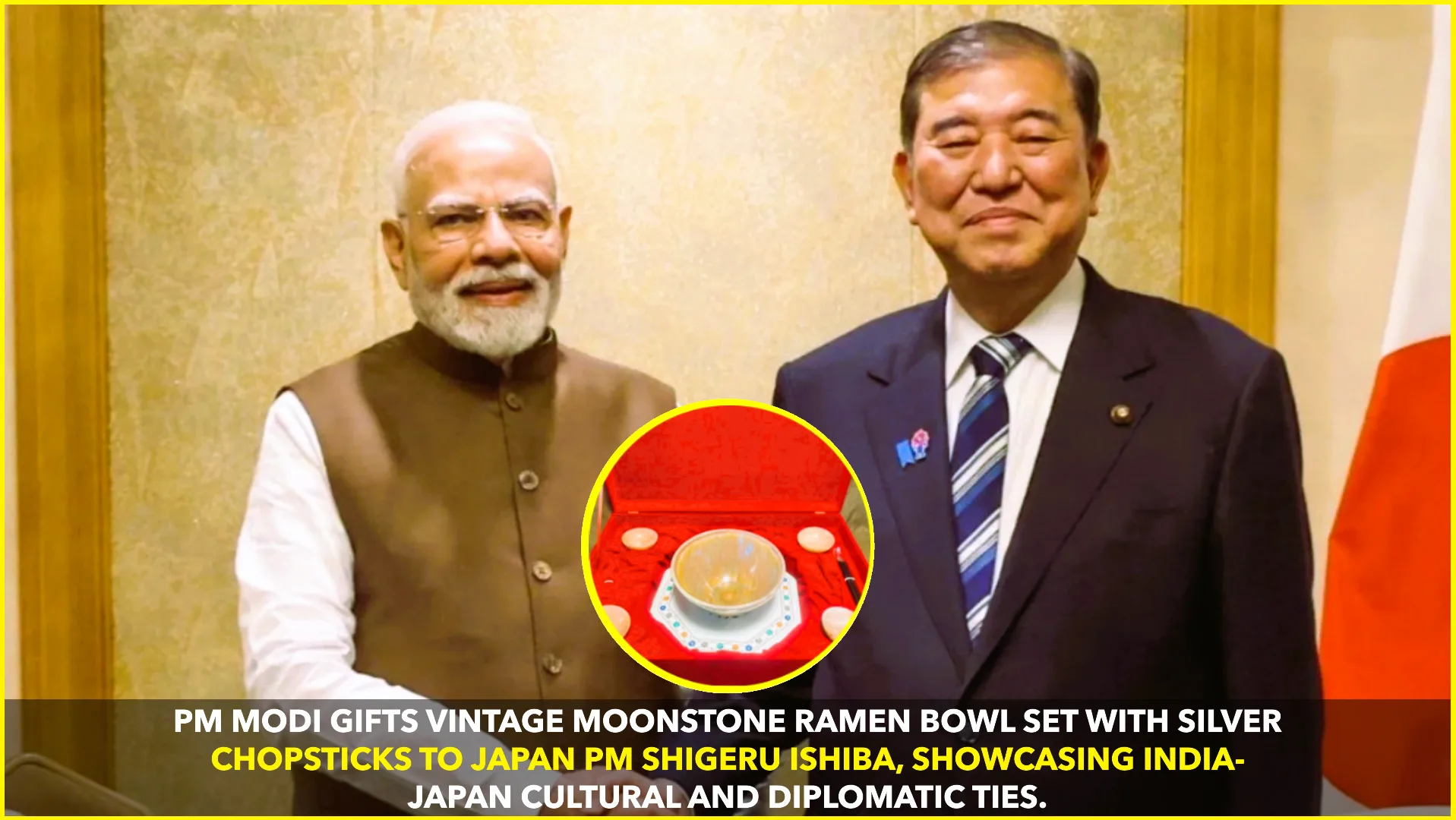Prime Minister Narendra Modi’s visit to Japan in 2025 was marked not only by high-level talks and strategic discussions but also by a warm gesture that reflected the cultural bridge between the two nations. As part of the traditional exchange of gifts, Modi presented Japanese Prime Minister Shigeru Ishiba with a vintage moonstone ramen bowl set, complete with silver chopsticks. The gift drew admiration for its unique combination of Indian craftsmanship and Japanese culinary heritage.
The centerpiece of the gift was a large brown moonstone bowl, accompanied by four smaller bowls inspired by Japan’s beloved donburi and soba traditions. The moonstone, known for its glowing adularescence—a shimmering light effect visible on its surface—was sourced from Andhra Pradesh, India. This gemstone has long been cherished for its spiritual significance, symbolizing love, balance, and protection.
Adding to its uniqueness, the base of the main bowl was crafted from Makrana marble, a material historically used in the construction of the Taj Mahal. The marble was decorated in the traditional Rajasthani parchin kari style, which involves inlaying semi-precious stones into marble to create intricate floral and geometric patterns. This artistic touch served as a nod to India’s rich heritage, while the overall design honored Japanese culinary customs, making the piece a true blend of the two cultures.
The silver chopsticks paired with the bowl set further emphasized the spirit of cultural harmony. While chopsticks remain central to Japanese dining, silver is associated with purity and prosperity in Indian tradition. Together, they symbolized the fusion of elegance, utility, and cross-cultural respect.
In addition to the moonstone bowl set, Prime Minister Modi also extended a personal gesture to the family of his counterpart. He gifted Ishiba’s wife a handwoven Pashmina shawl, carefully packed in a hand-painted papier-mâché box. Pashmina, sourced from Kashmir, is prized for its delicate softness and warmth, while papier-mâché is a traditional craft known for its colorful motifs. This thoughtful gift highlighted the role of women in cultural diplomacy and extended India’s message of warmth beyond the formal corridors of politics.
The gift exchange carried deeper symbolic meaning, representing the growing closeness between India and Japan. While the two nations already share strong ties in areas such as defense, trade, and technology, the exchange of culturally significant items underscored the importance of people-to-people connections and mutual appreciation of traditions.
Observers noted that Modi’s choice of a ramen bowl set was particularly meaningful. Japanese cuisine, especially dishes like ramen, soba, and donburi, is central to everyday life in Japan. By presenting a bowl designed for these foods but crafted using Indian materials and artistry, Modi demonstrated respect for Japanese culture while also showcasing India’s creativity.
Diplomatic gifting has always been a subtle yet powerful way to convey messages of goodwill. Over the years, Prime Minister Modi has been known for selecting gifts that carry cultural depth and symbolic weight. From Banarasi silk scarves to sandalwood carvings, each gift has represented an aspect of India’s heritage. The moonstone ramen bowl set, however, stands out for its cross-cultural design that celebrated both nations equally.
The Japanese Prime Minister and his wife expressed their appreciation for the gesture, calling it a thoughtful reflection of the friendship between India and Japan. Commentators in both nations highlighted the gift as a metaphor for the larger diplomatic relationship, where tradition meets modernity, and diversity strengthens unity.
Beyond the ceremonial moment, the 2025 visit itself underscored the strategic partnership between New Delhi and Tokyo. Discussions between Modi and Ishiba centered on enhancing cooperation in technology, clean energy, defense, and trade. Yet, the gifting ceremony provided a softer, more human dimension to the bilateral relationship, reminding the world that diplomacy is as much about cultural respect as it is about policy agreements.
As images of the moonstone bowl set and Pashmina shawl circulated on social media, they sparked conversations about cultural diplomacy and the role of art in international relations. For many, the gifts symbolized how India and Japan, while rooted in different histories, share a common vision for harmony and mutual growth.
In essence, the moonstone bowl set was more than a gift—it was a story of friendship, respect, and shared values. It showcased how two ancient civilizations can come together, celebrate their uniqueness, and build a future grounded in cultural and diplomatic harmony.










